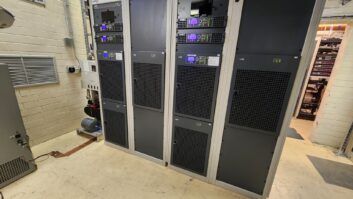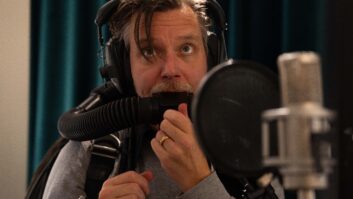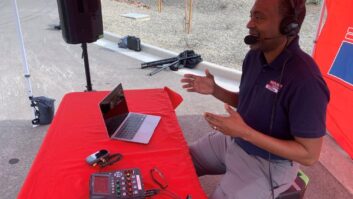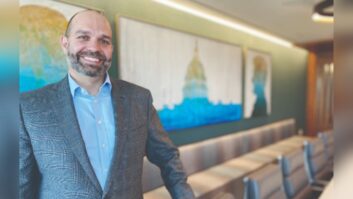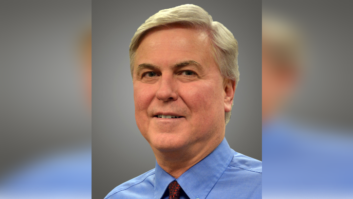The onset of a new year and the approach of a new spring compel us to think about where we’ve been the past year, where we are and where we want to go in the future.
For most of us still employed full-time in the midst of a fragile economy, the answer is simple and straightforward: Don’t do anything stupid, and do whatever it takes to remain employed. For others who want to improve their fortunes and move up, creative thinking, good networking and a little risk-taking will be necessary.

iStockphoto/Uyen Le Use the new year, the new season as an opportunity to take stock of what you’re doing today, and also what you want to do with your career going forward. Life is short; tomorrow is guaranteed to no one.
The paradox of change
Everyone realizes that radio and the technology that propels it have undergone enormous changes over the past decade. But when you think about change, a pair of conflicting old adages emerges: “The only thing certain in life is change.” However, “the more things change, the more they stay the same.”
Let’s consider the second one first. Radio really hasn’t changed very much at all in the minds of consumers and advertisers. We provide entertainment, information and companionship. The winning stations do this better than the also-rans. This raison d’être for radio is not going to change.
We still play the new hits and the familiar songs folks want to hear. And we provide the news, traffic, weather and the conversation they care about. Morning shows still do zany off-the-wall stunts, and the best show hosts of every daypart still have many adoring fans.
The single most important change in recent years is that the delivery mechanism is no longer just an AM/FM radio, but also the Internet. We’ve added websites and streaming to extend our brands. But listeners have a lot more choices for both the sources and the devices they can use. Our first adage of change is driving that reality.
Up-to-date technology
Radio has always been dependent on those who build and maintain the technical infrastructure that launches the product. That’s not going to change either.
Some may argue that the technology is now more complicated than what our predecessors of yesteryear had to deal with. I would contend that complexity has always been a challenge; now there simply is more technology to learn and control.
For those of you content to stay in your present role taking care of the existing systems you are responsible for, the imperative of ever-changing and improving technology will catch you. At some point most of you will have to deal with the challenge of installing and maintaining the updated replacement systems your managers and owners decide to acquire.
There are too many examples of old-school engineers who were skilled transmitter and analog equipment mechanics. But for whatever reason, they did not keep up adequately with the onslaught of digital and computer-based systems that found their way into their station operations. Many of them have changed careers, become RF contractors or retired; sometimes they’ve simply been replaced.
Most station and market cluster engineers have adapted to the reality that the digital and IP worlds have taken over our business at every level. How they choose to adapt and keep up depends on their personal circumstances and ability to learn and acquire new skill sets.
Luck of the draw
Every individual is blessed with unique and innate abilities and talents. No one person gets all the goodies at birth. Some get more than others, but most everyone gets at least a few that can be leveraged into success in life and in the workplace. Good parenting and good teaching can compensate in those who draw short on raw talent and ability.
The key for every human being is to discover his or her own talents and strengths and concentrate on developing those that can become marketable skills. If you’re lucky, using those skills to do what you most enjoy doing in a job and ultimately a successful career is one of the most satisfying accomplishments and rewards anyone can achieve in life.
It generally requires good analytical thinking and problem-solving to become a successful broadcast engineer. Being good with gadgets or good at math are plusses but don’t necessarily guarantee a person will be a good real-world problem solver. It is probably more important to be a good communicator and be able to work with others effectively.
Making technology deliver
Like almost everyone else in radio, managers and owners are enamored with but also fearful of the Internet and how the wireless revolution will affect our business. The smart ones increasingly are concerned about the torrent of technology change descending on virtually everyone in the industry. They expect their technical support departments to embrace new technology, learn it and enable it to keep their stations competitive and successful.
Ask any winning general manager to list their ideal qualifications for a chief engineer or technical manager and they will tell you: A solid background and successful track record working with not only transmission and studio equipment, but also computer, LAN, wireless and IP-based systems including Internet, website and social networking platforms.
That’s a lot of technology for anybody to get their arms around, but it’s not unreasonable for management to look for and hope to find someone that can handle it all. The younger generation of aspiring engineers generally will have most of the IP and studio gear end covered and typically only will need the transmission side to complete the lineup.
The job of managing technology in our business today goes beyond installation and maintenance. The larger scope of enabling technology for others includes sufficiently understanding the inner workings of a given system or application to be able to guide and assist the end users effectively.
When the users are creative content producers and important air talent, it is incumbent on us to find and give them the tools they ask for that allow them to be the most comfortable and most productive. When various options are available, it’s really not up to us to decide unilaterally what is good enough or adequate. Management may have to adjudicate when reasonable differences of opinion occur.
The people part
Managers always want employees with good people skills. The importance of that in today’s environment cannot be overstated. Any multi-station cluster CE or technical manager spends much of his time communicating with management and other department heads. He then enables himself and others to make things happen.
With the recession and staff downsizing in all markets, there are quite a few capable and competent engineers who have found themselves out of work and sitting on the sidelines. In many cases, the lack of self-discipline or good judgment, unreliable work habits, poor communications, a poor attitude or inability to work effectively with others have been factors. Managers will always favor keeping another employee or hiring someone else who is not hampered by such shortcomings if the necessary skill sets are similar.
Learning how to change our attitude and the way we interact with others is perhaps a challenge best suited for Dr. Phil or perhaps a self-help motivational seminar by Wayne Dyer, Zig Ziglar or Dale Carnegie. There are certainly a ton of books on the subject to pick from. But for most, a trusted mentor or family member helps to get that personal “inner light of understanding” to turn on more quickly.
Old habits and mindsets die hard but for those who embrace an appropriate plan or program to change their behavior patterns for the better, life-changing results can occur.
After reflecting on where you want to go and what you want to become, make a resolution to commit to an action plan that can make it possible. Unless you really want something to change in your life and work every possible angle to achieve it, it’s not likely to happen. Let’s all endeavor to harness the power of change to help us reap big dividends in 2011.
Guy Wire is the pseudonym of a veteran broadcast engineer. Read his archive under the Columns tab at radioworld.com.





